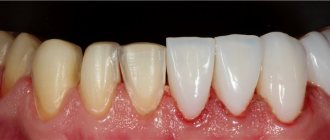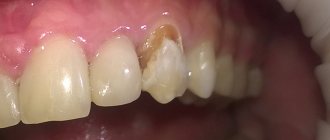body .attr-article__date{ background: none; padding: 0; }
NEAD EAD SEAD South Administrative District South-Western Administrative District CJSC Central Administrative District SZAO Northern Administrative District 01 02 03 05 06 07 08 09 1 0 1 1 1 2 14 18 15 16 17 Babushkinskaya Prospekt Mira Pervomaiskaya Baumanskaya Paveletskaya Teply Stan Shipilovskaya Prague Academic University Barrikadnaya River Station Oktyabrskoye Bratislava Taganskaya Academician Yangelya October Field
The call center is open 24 hours a day
Ambulance 24/7
Home Health from A to Z Useful information Preparing a child for the first visit to the dentist
Date of publication: 04/04/2016
until January 31
You get 10% cashback when purchasing a gift certificate More details All promotions
Is psychological preparation necessary for a child’s first visit to the dental office? - Of course, it is necessary. Its main goal is to prevent your child from feeling nervous or anxious before visiting the clinic, and to encourage the child to cooperate with the doctor.
Top tip:
Child at a dentist appointment
- If the reason for the visit is pain:
convince the child that the dentist will help - the pain will become less or go away completely. - If there is no pain and the first visit to the dentist is done as planned:
you should not try to prevent the child’s negative reaction by saying: “don’t be afraid,” “it won’t be scary,” “it won’t hurt.” He doesn’t yet know that he should be afraid of something. It is better to set your child up for a positive outcome from the visit.
You can say to small children: “The doctor will look at their teeth, brush them, and they will be happy.” For older children, rational argumentation is appropriate: “Go to the dentist, your teeth will be healthy and beautiful.”
Some more general tips:
- When going to the dentist, do not focus on this.
- Do not emphasize the importance, exclusivity, or even more so the unpleasantness of the event. A visit to the doctor should be a given.
- Don't say that the doctor won't do anything.
- This is not true, and then the child will understand that he was deceived. Tell them that the doctor will look at your teeth and treat them if they are sick.
- Do not use the “scary” words “prick”, “drill”, “drill”, “drill”.
- You can play at visiting a doctor.
Tell us how to enter an office, sit in a chair, open your mouth and keep it open. Do every action with your child, take on the role of a doctor.
What to tell your child:
Each child is a unique personality, and each needs an individual approach. But we can offer a general outline of the conversation. If the child is small and hardly understands why and why they want to take him to the dentist:
- say that you will go together to a good doctor who will treat your teeth. All the children go to him because he loves them and treats them. All boys and girls come out cheerful and healthy from him.
- Explain what the good doctor will do: “He will look at your teeth to see how they are growing.”
- Give a couple of “strong” arguments: “When dad and mom were little, they also went to the doctor to check their teeth.” Or: “This doctor had...” (name a fact known to you: the eldest child in the family, a neighbor’s child, etc.).
- Emphasize that you will be nearby at all times in the doctor's office.
If the child is older and understands his dental problems, proceed as follows:
Preparing for a visit to the dentist
- Talk about why it is important to have healthy teeth.
- If your son or daughter says that they are afraid of the dentist, you will be sincerely surprised: “Why should you be afraid of the doctor? He helps us get rid of troubles, advises, heals, and takes care of our health.”
- If you yourself have ever expressed fears in the presence of a child before a visit to the dentist or shared unpleasant memories, admit the error of your position: “I was also scared, but everything turned out to be different - attentive doctors, painless treatment. The main thing is to set yourself up positively.”
- Finally, show your willingness to support your child: “Let's go to counseling together. I will be present in the office during your conversation with the doctor.”
(According to the article by Professor V.V. Boyko, a dentist of the highest category, “How to prepare a child for a visit to the dentist”).
Important!
The pediatric dentists at Family Doctor are true professionals. They love children and strive to find an individual approach to each child. However, the best results are achievable with the cooperation of the doctor and parents.
Make an appointment Do not self-medicate. Contact our specialists who will correctly diagnose and prescribe treatment.
Make an appointment
Useful tips for parents:
- Make an appointment in the morning so that your child does not have a reason to worry all day about the upcoming visit. In addition, young children are usually calmer in the morning,
- One parent is sufficient to accompany the child to the clinic. Bring your baby's favorite book or toy with you. While waiting, he can be distracted by reading, looking at pictures or, for example, playing a game.
- Before going on a hike, it is also advisable that the child is well-rested and does not have colds or other diseases. If this happens on the day of your planned visit to a specialist, then it is better to postpone the visit until better times.
About feelings
It is quite normal that when bringing a child to the dentist, a parent feels nervous and worries about how everything will go.
And if a child is in pain, then he suffers along with him. Perhaps he feels guilty and wants to quickly change the situation and alleviate the baby’s suffering. If you are familiar with such feelings, then listen to our advice:
- It is a mistake to exaggerate the seriousness of the situation and escalate the situation. This way you can scare the child in advance and he will be tense even before the appointment.
- But you shouldn’t underestimate the situation either, otherwise the child will not realize the importance and necessity of treatment.
- Do everything possible to prevent your anxiety from being passed on to your child; act naturally and at ease. This will also allow the child to be calm and free.
It is easier for the doctor to find contact with a calm child.
And if the child is free, he will quickly talk about his fears or other experiences. After all, it is precisely these experiences that can interfere with treatment. And then the doctor, knowing this, will choose the appropriate work tactics.
Bargaining and leveling
If all this does not help, then you can promise the child a reward for courage and perseverance. If the baby behaves calmly, then after a visit to the dentist you can, for example, go to the zoo. Or buy an interesting book. Or just take a walk in the park.
Don't promise sweets or anything else. If a child gets a filling, he still won’t be able to eat for two hours after the procedure. Better - some kind of joint activity or hobby. And most importantly, keep your promise. Otherwise, the child’s stress will double – not only from the visit to the doctor, but also from lies from the parents.
Anesthesia or anesthesia?
Photo from greatlakesanesthesiology.com
The main thing that worries parents is, of course, anesthesia. The decision to undergo general anesthesia is not easy, but sometimes it is the only option. This option is suitable when the child is too small and the teeth are too damaged by caries. It’s difficult to keep a two- or three-year-old baby in one position; he spins, and the drill, if it accidentally falls off, can cause a lot of trouble in his tiny mouth.
Otherwise, as under anesthesia, the baby cannot be treated, but treatment is necessary, because caries can affect the health of the permanent tooth bud, and having a constant source of infection in the mouth is dangerous to health.
General anesthesia is not used for one tooth; it is used when several teeth need treatment at once, and they try to do as many manipulations as possible in the allotted time. Provided the anesthesiologist works competently, there will be no negative consequences.
Photo from greatlakesanesthesiology.com
There is no need to be afraid: if the clinic has a license to provide general anesthesia, all safety measures are in place.
During the operation, according to the protocol, the presence of an anesthesiologist and his assistant (nurse or nurse) is required to monitor the child’s condition. There is all the equipment necessary in case of an emergency - a defibrillator, a ventilator, medicines for resuscitation. But it's more like insurance. I repeat that if the anesthesiologist works adequately, there is no danger to the life and health of the child.
When it comes to local anesthesia, the question of possible allergies . I want to reassure parents - modern drugs almost do not give such a reaction, in addition, they contain little or no adrenaline, so they are allowed for pregnant women and nursing mothers, that is, in fact, they are safe even for a baby.
Before injecting, the doctor must do a microtest on the gum, dropping a drop of the substance and observing the reaction. In case of emergency, doctors always have medications that can relieve an acute allergic reaction.
And yet, if you are very worried, I recommend doing allergy tests for all types of anesthesia in advance - this is now possible in some network laboratories. This way you will know in advance if your child has an intolerance to any drug.
What you should absolutely not do
- there is no need to tell the child that the doctor will just take a look and that’s all. After all, after an examination, the doctor may decide that it is necessary to carry out cleaning or treatment. It turns out that you are deceiving, and in the future it will be very difficult to build trust. If you want to teach your child not to be afraid of the dentist, you need to be honest with him. Today it is very simple, because modern anesthetics have made dental treatment quick and completely painless, so there is no need to invent or embellish anything,
- You shouldn’t promise your child a gift for going to the doctor. In this case, he may decide that he has a difficult test ahead of him, since he is rewarded for it,
- There is no need to buy your child a gift or sweets even after visiting the dentist. After all, such visits should become ordinary and regular for the child.
- do not say that there will be no pain or, for example, that you need to be patient. The very idea that you will have to muster up the courage to visit the dentist may not even occur to the child. But after such words she will definitely appear, and the little man will understand that during treatment he may be hurt and scared,
- do not scold the child if he does not open his mouth and refuses to obey the doctor. Screaming will not help matters, but finding an approach to a frightened baby is the task of our pediatric dentist.
The importance of prevention
Many mothers and fathers are subject to the mistaken opinion that it is not worth treating baby teeth at all, because their service life is very short and soon the baby teeth will be replaced by a permanent one. However, this belief is fundamentally wrong, since the formation of the rudiments of permanent teeth directly depends on the condition of temporary teeth. Caries or pulpitis in an advanced form can negatively affect the rudiments and lead to more serious dental problems in the future.
Teach children about oral hygiene
Therefore, it is extremely important to be on guard of the health of the baby’s teeth and gums from a very early age. Teach your child to perform thorough oral hygiene twice a day using a soft-bristled brush and toothpaste. For very small children, you can use special wipes or a fingertip designed to carefully remove deposits from the enamel surface. Consult your pediatric dentist about choosing an appropriate toothpaste. Make sure your baby's diet is rich in solid fruits and vegetables. Take your child to the dentist regularly for checkups.
Answering the question why children are afraid of dentists, it is worth noting that most often the parents themselves are to blame. Many adults still experience an overwhelming fear of the dental office, and excitement and anxiety are inevitably passed on to the baby. In this state, it will be very difficult to calm the child, so before going to the dentist, you should first deal with your emotions and experiences.
- According to the World Health Organization (WHO).
Union with a doctor
A problem with a child’s teeth is a common problem for parents, the child and the doctor. Each of the participants in the process has their own tasks. But the treatment will take place and proceed normally if we combine efforts, therefore:
- Try to tell your doctor all the necessary information. Not only about health, but also about the child’s character: what he loves, what he does, what he dreams about, how you usually agree with him.
- Often when a child resists treatment, parents really want to help the doctor, but if you see that your actions are not helping, then give the doctor the opportunity to find contact with the child himself. Take on the role of observer.
- Be prepared for the fact that the doctor, after discussing the treatment plan and cost with you, will ask you to leave him alone with your child. Please be understanding about this. Moreover, according to our research, this is a fairly effective way to overcome problems in a child’s behavior.
What to do when a child is very afraid and does not want to have his teeth treated: how to persuade him to go to the dentist
Some modern techniques, developed jointly with psychologists, involve exciting adventures, while others involve a preliminary study of possible problems. Below we talk about the most successful and popular practices that can be easily adapted to Russian reality.
Playing doctor
This is a unique tool for understanding the world around us, especially in childhood. Even the most unremarkable and disgusting things seem more attractive and interesting if they are presented in a positive playful way. Turning a standard trip to the dentist into a real adventure is an art. However, if you don’t want your baby to develop dental phobia, this is exactly what you should do.
Below are the most successful entertainment scenarios:
- Offer to treat your favorite toy's teeth. The child will be so interested in the process that he will want to check the condition of his own.
- Role-playing game. Something from the “mother-daughter” category, only “doctor-patient”. First, the parent will act as a dentist - just to explain and tell how everything works. And then the baby will try on this image. Such tricks help dispel fears before visiting the office.
- A fairy tale about the good doctor Aibolit. Before your visit, you can watch the old cartoon.
Of course, this is not a complete list of all games. You are free to invent and propose your own. The main thing is to create a comfortable psychological environment.
Reward and encouragement
Just as bad behavior in a dental clinic should be discouraged, good behavior should be rewarded. It is best to give the gift to the doctor so that he, in turn, gives it to the baby. Such a simple manipulation will win the favor of the little patient.
However, gifts should not become a management tool. During each visit, the child is introduced to the culture of health care and is more responsible about the state of the oral cavity.
Cartoons during treatment
Watching your favorite cartoon during a visit will help you take your mind off what the doctor is doing and concentrate on something more pleasant. This technique is actively practiced by dentists at Dentic Kids.
Own example
Of course, cartoons, games, gifts are all very good. But remember, nothing works better than a worthy personal example. If you yourself literally faint at the mere mention of the need to see a dentist, it is unlikely that you will be able to develop a love for this specialist in your children. That is why, before raising them, it is important to work through your own fears and phobias.
If, on the contrary, you understand the importance of dental treatment and endure any procedures, then it would be a good idea to go to the session with your baby. There he will see your positive attitude and will quickly be charged with the right mood.











